Planting method and Propagation of Flowers-- Narcissus
I believe you have seen daffodils, for we like flowers and plants, for daffodils, the general growth period of daffodils is autumn and winter, generally dormant in summer, in the growth period is the need for long-term sufficient sunshine, let me take you to understand how daffodils are raised!
Cymbal
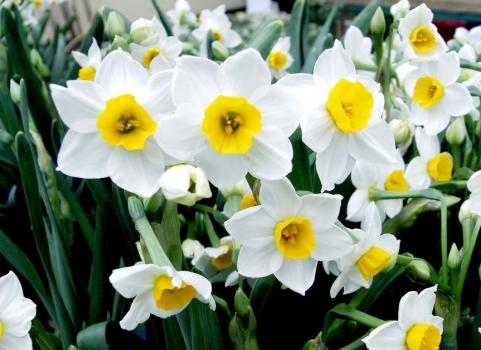
I. three culture methods of daffodils
1. (soil culture) that is, the cultivation of daffodils by using the cultivation methods of most moist soil flowers. Generally speaking, family cultivation is rarely used. Soil culture of daffodils requires the use of loose humus soil, peeling off the dry bulbs of daffodils and scraping off the old roots before cultivation. Add humus to the edge of the basin about 3 cm, shake the basin to make it tight, then put the daffodil bulb plate into the picture of about 1 cm, then pour water, move the flowerpot to a cool place, wait 5 days after the bulb grows, and then move to the sun for breeding. Soil daffodils should pay attention to the dry and wet soil, and it is an extreme way of treatment, dry and wet. That is to say, if the soil is not dry or watered, once it is watered, it will be watered until the bottom of the basin leaks, and the watering time is generally chosen in the morning and evening, and it is easy to destroy the root growth if watered during the day. Please read on the environmental requirements and detailed maintenance methods and precautions.
2. (water culture method) that is, the shallow basin water immersion method is used to cultivate narcissus in the family. Before raising daffodils, remove the dry brown scales on the outer layer of the daffodil's head, as well as the root mud and the brown rotten roots at the base (be careful not to touch the new roots). Wash the appearance and stand it upright in a shallow basin without drainage holes. Pour clean water into the basin, submerge the bulb about 1 cm, put it in a cool place, grow roots with bulbs, and then put it in the sun. Water daffodils had better change water every day, on the one hand, it can prevent the rotting roots caused by water deterioration and pollution, on the other hand, the roots grown by changing water every day are more white and beautiful. The change of water is preferably tap water that has been dried in advance, which can kill bacteria. Keep the head of the flower soaked in water for less than one and a half, and change the water every 2 to 3 days before flowering.
Cymbal
3. (sand culture method): it is best to choose clean fine sand, and the basin is also required to be a tile basin with good breathability. before planting, put the sand into the basin, such as 3 cm along the edge of the basin, put the daffodil head peeling off the old stem and leaves in the basin, and then add about 1 cm of sand to the flowerpot filled with fine sand, then bury the lower stem of the daffodil head in the sand about 1 cm, spread small Xu pebbles above, and then pour through water and put it in the shade. Transfer to sunny place after 5 days. The use of fine sand stone culture method to cultivate daffodils should be watered every day, if watering is not timely, it is easy to cause water shortage and affect the growth of flower roots. Of course, watering should be carried out sooner or later as far as possible.
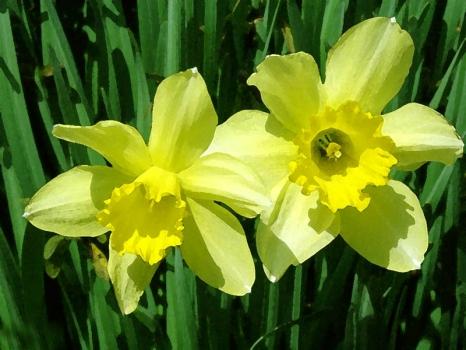
Cymbal
II. Requirements for the culture of daffodils
1. Suitable temperature. First of all, it is necessary to understand the growth habits of daffodils. Daffodils are plants that like shade in the early stage and warm in the later stage. generally speaking, daffodils are generally at 18-20 degrees Celsius is the most suitable temperature for growth, so to cultivate good daffodils, we must first understand the growth temperature requirements of daffodils.
2. The requirement of soil. Generally, when cultivating daffodils, if there are certain requirements for the soil, what the daffodils need in the breeding process is the kind of loose and fertile soil, and it is best to choose the sandy soil with good water retention capacity.
3. Appropriate amount of light. Daffodils generally belong to short-day plants, oh, in general, give about 6 hours of light every day, so in the process of breeding, daffodils can be put on the balcony for an appropriate amount of light time, oh, if the light time is not enough, it will lead to less daffodils blooming.
4. Plenty of water. Daffodils generally need sufficient water during the period of growth and development, the growth and development period needs to provide sufficient water for daffodils, and the growth and development period is the peak period of daffodil metabolism, oh, generally in the mature period, metabolism will generally weaken.
5. Adequate nutrition. Flowers, like people, need adequate nutrition during their growth, so during their growth and flowering, daffodils should apply a little phosphate fertilizer, which can make the daffodils bloom more beautifully, but we should also be careful not to apply too much phosphate fertilizer, otherwise it will have an impact on the daffodils.
Cymbal
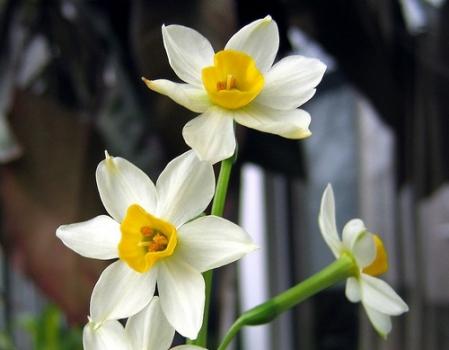
Matters needing attention of daffodils
(1) Cold protection: although daffodils can withstand a certain low temperature, they are also afraid of thick frost and severe cold. Occasionally, when there is a thick frost, spray water to wash the frost before sunrise, so as not to harm the daffodil leaves. For weather below-2 ℃, cold protection measures should be taken. Wind barriers can be planted in warmer areas, and thin films can be used in Shanghai to prevent the daffodils from getting cold.
(2) prevent rotting roots: first of all, if the water is empty at night, the roots will not dry up. Hair root yellow hair soft, to frequently change water, daffodils to keep the water clean, it is best to change water every 2-3 days, in order to prevent root rot. Soft toothbrushes can be used for yellowing.
(3) mature fruits cannot be placed next to narcissus plants: in case ethylene and other gases released from various fruits accelerate the withering of flowers, shorten the florescence, for fear that iron daffodils can not be raised with iron, apply ceramic, glass, plastic and other utensils, otherwise the water will mildew the engraved parts of flower buds and fibrous roots.
(4) fear of saline-alkali water: daffodils should be fed with well water, Rain Water, river water or river water. If tap water is used, it should be clarified by storing water in the basin or tank 2 to 3 days in advance.
(5) fear of high temperature and low temperature water: the culture temperature should not be too high or too low, and the appropriate range is 4 ℃ to 25 ℃, of which 15 ℃ to 18 ℃ is the best. Too high temperature will cause excessive growth of leaves, dark color of flowers and dwarfism of scape.
(6) fear of foliar dirt: keep the foliage clean during water culture, otherwise it not only affects beauty but also weakens photosynthesis, water should be sprayed to the plant every day to maintain water balance in the plant, but also make the leaves bright and beautiful, which is conducive to photosynthesis.
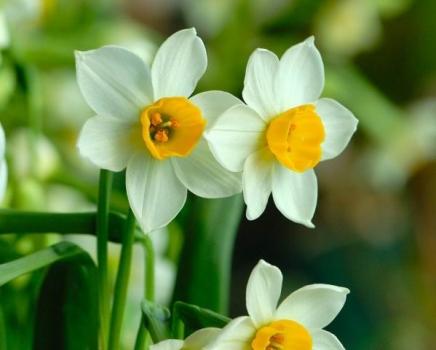
Propagation methods of daffodils
1. Lateral bulb reproduction
This is the most common and commonly used method of reproduction. The storage ball is planted on both sides of the bulb, and only the base is connected with the mother ball, so it is easy to break away from the mother ball. It will be separated from the mother ball in autumn and planted separately, and a new ball will be produced the following year.
2. Lateral bud propagation
Lateral buds are buds enclosed in bulbs. Only during bulb castration do they detach from the mother with the dug scales, pick out white buds, sow them on the seedbed in autumn, and produce new balls the following year.
3. Double scale propagation
(1) A bulb contains many lateral buds, some visible and some invisible. But its basic rule is to spare two scales and one bud.
(2) using a bulb disk with two scales as breeding material is called double-scale reproduction.
(3) the method is to put the bulb at a low temperature of 4-10 ℃ for 4-8 weeks, then cut the bulb disc small at room temperature, so that each piece has two scales, and remove the upper end of the scale and leave 2 cm as propagation material, then use a plastic bag to hold 50% water-containing vermiculite or 6% water-containing sand, put the breeding material into a bag, close the mouth of the bag, and place it in a dark place at 20-28 ℃ temperature.
(4) bulbs can grow after 2-3 months, and the ball-forming rate is 80-90%. This is a new method that has been developed in recent years, which can be carried out in the four seasons, but it is better from April to September.
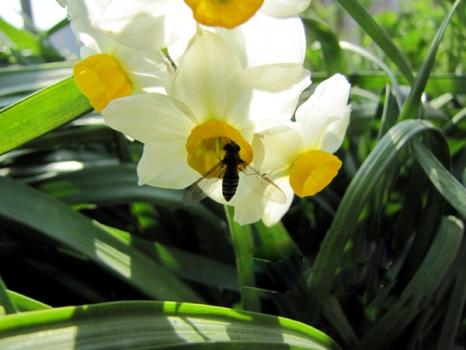
After understanding the above knowledge, I believe you have a more specific direction for daffodil culture. So quickly start to make the daffodils around you more noble and beautiful!
- Prev
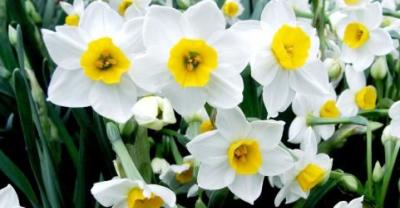
In California, it is legal to grow marijuana
In California, growing marijuana is legal, so Californians grow marijuana like Chinese soybeans. Some people go to California to make a fortune by growing marijuana. In America...
- Next
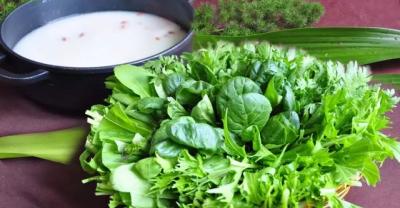
Five tips for planting daffodil balls
Know that many partners have their own daffodil balls, but many friends are bought daffodils directly hydroponic culture, of course, the main point here is also.
Related
- Fuxing push coffee new agricultural production and marketing class: lack of small-scale processing plants
- Jujube rice field leisure farm deep ploughing Yilan for five years to create a space for organic food and play
- Nongyu Farm-A trial of organic papaya for brave women with advanced technology
- Four points for attention in the prevention and control of diseases and insect pests of edible fungi
- How to add nutrient solution to Edible Fungi
- Is there any good way to control edible fungus mites?
- Open Inoculation Technology of Edible Fungi
- Is there any clever way to use fertilizer for edible fungus in winter?
- What agents are used to kill the pathogens of edible fungi in the mushroom shed?
- Rapid drying of Edible Fungi

